Flagyl, also known as metronidazole, is an antibiotic increasingly used to treat various bacterial and protozoal infections in cats.
This medication can be especially beneficial for dealing with gastrointestinal issues, such as diarrhea and inflammatory bowel disease, making it a vital tool in pet care.
Knowing when and how to use Flagyl for your cat can help ensure they stay healthy and comfortable.
As a pet owner, it’s crucial to understand not just the benefits of this medication but also the proper dosage and potential side effects.
When administered correctly, Flagyl can effectively alleviate your cat’s symptoms and improve their overall condition.
However, it’s equally important to be aware of any interactions with other medications and to consult your veterinarian for guidance.
Understanding your feline friend’s needs and the role Flagyl can play in their treatment can help you make informed decisions.
From dosing to monitoring for side effects, being proactive in managing your cat’s health is key.
Key Takeaways
- Flagyl is effective for treating bacterial and protozoal infections in cats.
- Proper administration and monitoring are essential to ensure your cat’s safety.
- Consult your veterinarian for personalized advice on your cat’s treatment plan.
Understanding Flagyl
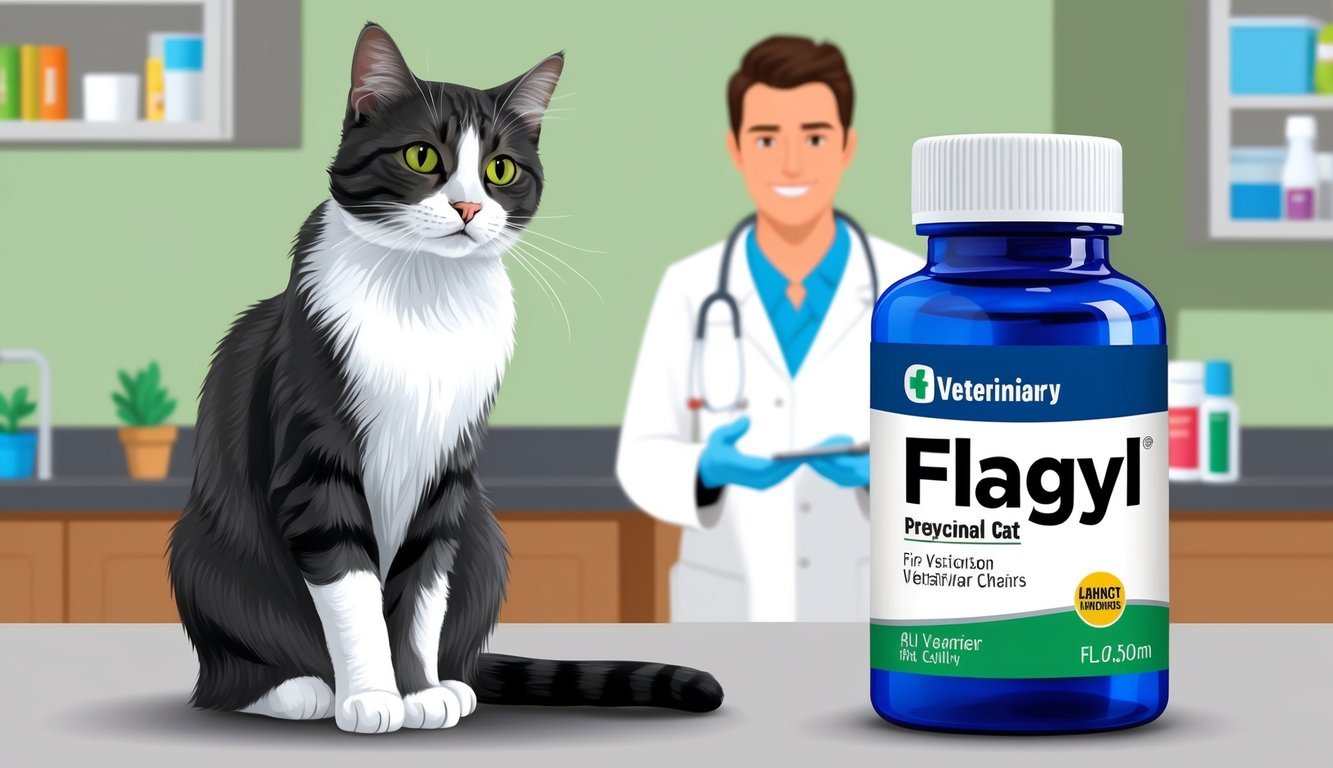
Flagyl, known generically as metronidazole, is both an antibacterial and antiprotozoal medication.
It’s primarily used to treat infections caused by bacteria and certain parasites in your cat.
This medication works by disrupting the DNA of these harmful organisms, effectively preventing their growth and reproduction.
It’s beneficial for various conditions, particularly gastrointestinal issues like diarrhea and infections from Giardia.
Key Points about Flagyl:
- Dosage: The typical dosage for most cases is 7.5 mg to 10 mg per kilogram of your cat’s body weight, taken twice daily.
- Giardia Treatment: For confirmed Giardia infections, the increased dosage ranges from 10 mg to 25 mg per kilogram, also given twice daily for five days.
- Common Side Effects: While most cats tolerate Flagyl well, watch for signs like salivation, vomiting, or reduced appetite.
Always consult your veterinarian to determine the appropriate dosage and duration for your cat’s specific needs.
Using Flagyl responsibly will help ensure the health and well-being of your feline friend.
Benefits of Flagyl for Cats
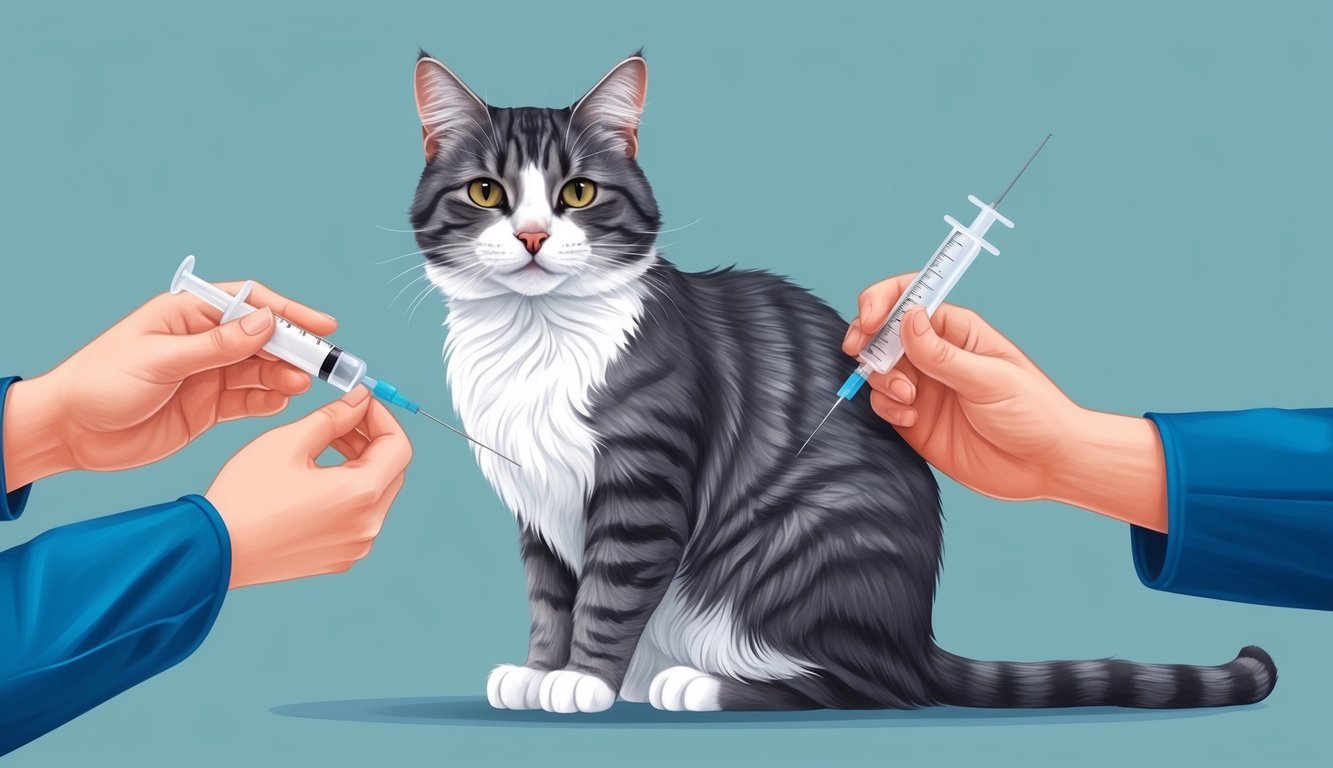
Flagyl, or metronidazole, offers various therapeutic benefits for your cat, notably in treating infections and managing specific gastrointestinal issues.
Understanding these benefits can help you make informed decisions about your pet’s health care.
Treating Infections
When your cat faces bacterial infections, particularly those caused by anaerobic bacteria, Flagyl is often an effective treatment option.
It works by disrupting the DNA of these bacteria, ultimately leading to their death.
Flagyl is also effective against certain protozoal infections, such as Giardia.
This intestinal parasite can cause diarrhea and upset stomach in your cat.
Administering Flagyl can help eliminate Giardia, alleviating your cat’s discomfort.
Here’s a quick overview of Flagyl’s effectiveness:
- Targets anaerobic bacteria: Effective in a range of infections.
- Giardia treatment: Fast relief from gastrointestinal symptoms.
Managing Gastrointestinal Conditions
Flagyl is beneficial for managing conditions like inflammatory bowel disease (IBD) in cats.
IBD is characterized by chronic inflammation of the digestive tract, leading to symptoms like vomiting and diarrhea.
Using Flagyl can help reduce inflammation and support a healthier gut microbiome.
It also aids in controlling symptoms, allowing your cat to feel more comfortable.
Dosage should be carefully monitored by your veterinarian, typically ranging from 7.5 mg to 25 mg per kilogram of body weight.
Consider this when discussing management options with your vet:
- Alleviates gastrointestinal symptoms: Helps control vomiting and diarrhea.
- Supports gut health: Promotes a better balance of intestinal bacteria.
Proper Dosage and Administration
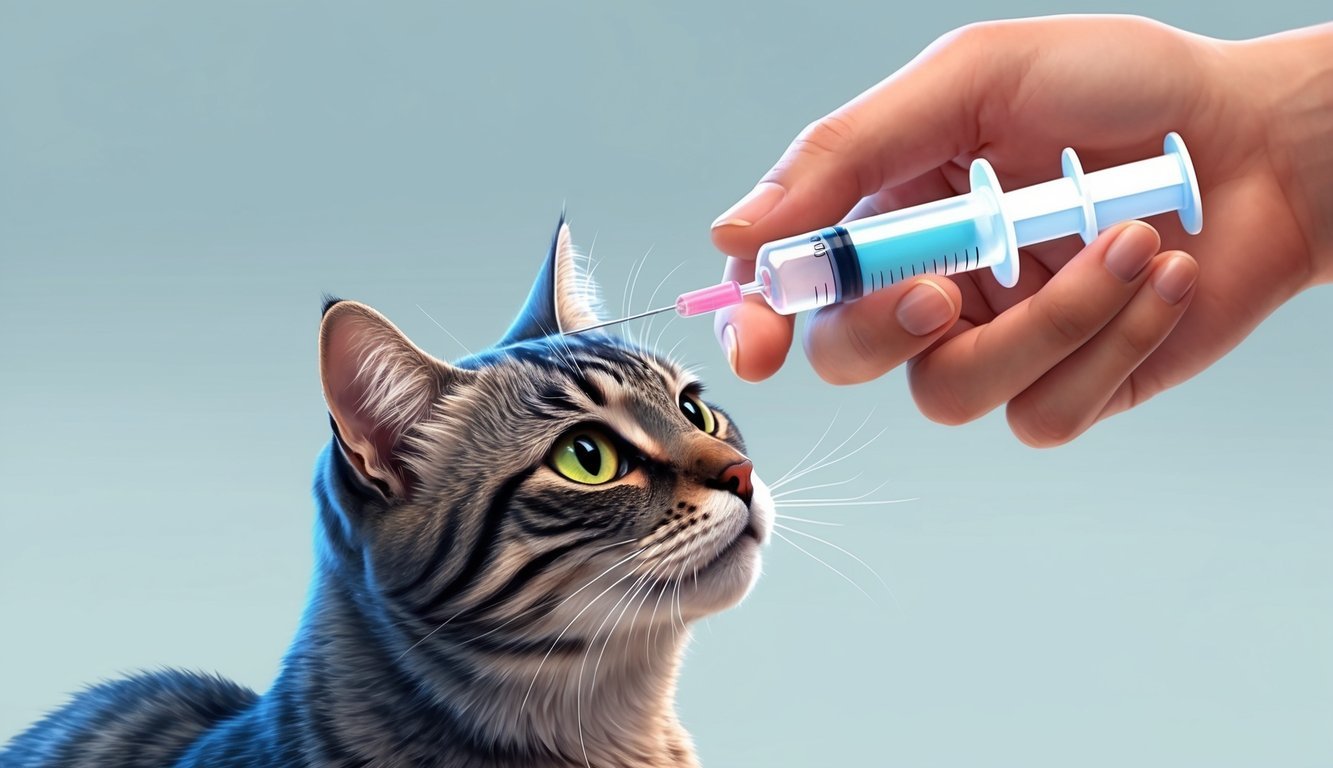
Administering the correct dosage of Flagyl (metronidazole) to your cat is essential for effective treatment.
The medication comes in various forms, making it important to select the one that suits your cat’s needs best.
Dosage Guidelines
The safe dosage for treating diarrhea in cats is typically 7-10 mg/kg or 3-5 mg/lb, given twice daily.
For Giardia infections, the recommended dosage is higher, ranging from 10-25 mg/kg twice daily for 5 days.
For kittens, the dosage may be adjusted based on their size and overall health.
Always consult your veterinarian for an accurate dose tailored to your cat.
Keep in mind that administering too much can lead to toxicity, so precise measurement is crucial.
It’s advisable to use a small digital scale for accuracy.
Forms of Flagyl
Flagyl is available in several forms, including:
- Tablets
- Capsules
- Liquid Suspension (200 mg/5 ml)
- Injectable Solutions
Each form allows for different methods of administration.
Tablets and capsules might require hiding in food, while liquid forms can be measured precisely using a syringe.
Injectable forms often necessitate vet visits but can be effective for serious infections or cats that resist oral medications.
Evaluate what works best for your cat’s preferences and needs while ensuring you follow your vet’s recommendations.
Potential Side Effects

When using Flagyl (metronidazole) for your cat, it’s essential to be aware of possible side effects.
These may vary in severity and can affect different systems in your cat’s body.
Gastrointestinal Discomfort
Gastrointestinal issues are common when cats take metronidazole.
You might notice symptoms like nausea, vomiting, and diarrhea.
Drooling can also occur due to the drug’s bitter taste, leading to a lack of appetite.
It’s crucial to monitor your cat during treatment.
If these symptoms persist or worsen, contact your veterinarian.
Adjustments in dosage or alternative medications may be necessary.
Understanding these effects helps you provide the best care during your cat’s recovery.
Neurological Effects
Some cats may experience neurological side effects, primarily when given higher doses of metronidazole.
Symptoms can include lethargy, disorientation, and, in rare cases, seizures.
If you observe any unusual behavior, it’s important to consult your vet immediately.
They can assess whether the dosage needs to be adjusted or if a different treatment plan should be considered.
Keeping a close eye on your cat’s neurological health is vital during their medication course.
Allergic Reactions
Though rare, allergic reactions to metronidazole can happen.
Signs of hypersensitivity may include itchy skin, swelling, or difficulty breathing.
If you notice any of these symptoms, stop administering the medication and seek emergency veterinary care.
Your cat’s health and safety should always come first.
Always inform your veterinarian about any changes in your cat’s behavior or health while on medication to ensure a swift response to potential side effects.
Interactions and Contraindications
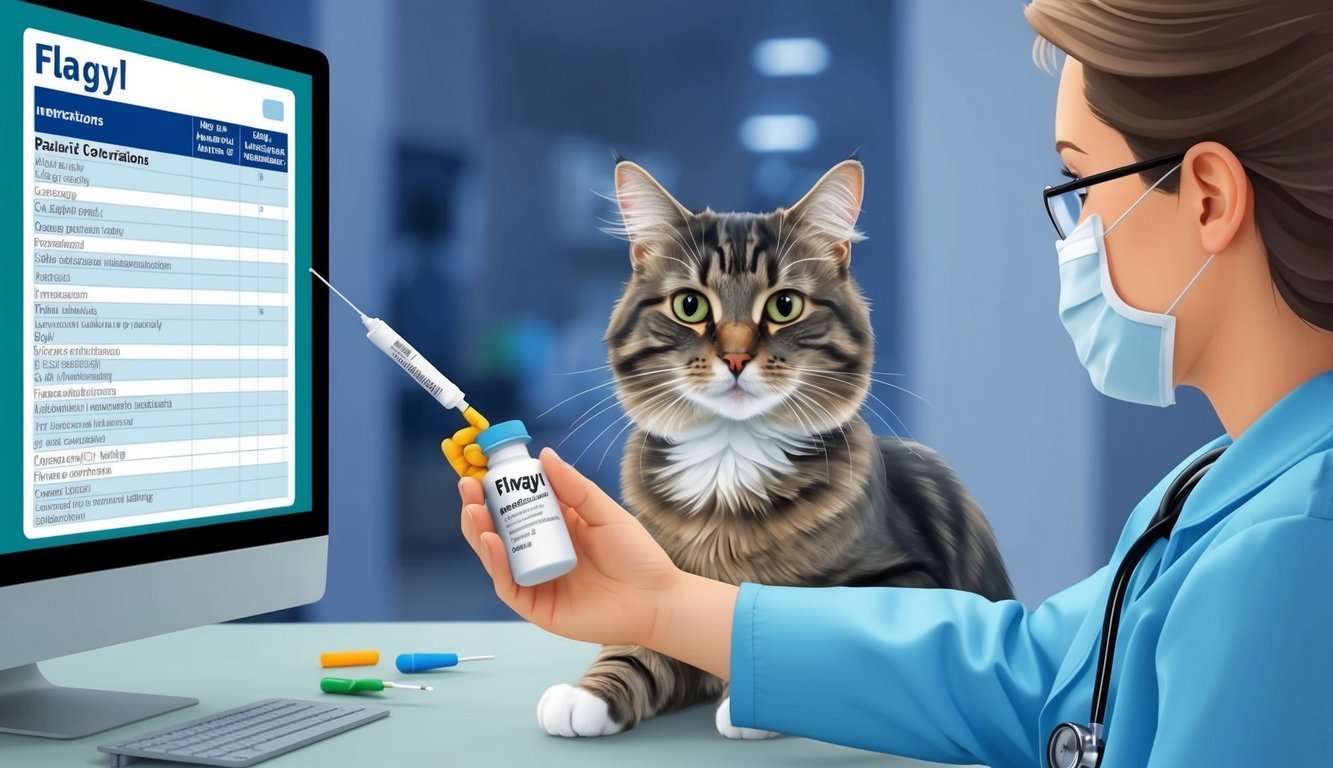
When considering Flagyl (metronidazole) for your cat, it’s crucial to be aware of potential drug interactions and contraindications that could affect their health.
Understanding these factors will help ensure their safety during treatment.
Drug Interactions
Flagyl can interact with several medications, so it’s important to inform your veterinarian about all drugs your cat is taking.
Here are a few key interactions to keep in mind:
- Phenobarbital: This anticonvulsant can reduce the effectiveness of Flagyl by increasing its metabolism in the liver.
- Cimetidine: This antacid may elevate Flagyl levels in the blood, boosting its effects and side effects.
- Warfarin: If your cat is on blood thinners, Flagyl can enhance its anticoagulant effects, increasing the risk of bleeding.
- Cyclosporine and Phenytoin: Flagyl may alter the concentration of these drugs, requiring adjustments in dosing.
Always discuss current medications with your vet before starting Flagyl.
Contraindications for Use
Some conditions make the use of Flagyl unsuitable for your cat.
Be cautious if your cat has:
- Liver Disease: Since Flagyl is metabolized in the liver, impaired function can lead to toxic levels.
- Kidney Disease: Renal impairment may affect drug clearance, increasing the risk of side effects.
- Pregnant or Nursing Cats: Flagyl may not be safe as it can affect fetal development or transfer to nursing kittens.
Ensure your veterinarian evaluates these factors carefully to determine the suitability of Flagyl treatment for your cat.
Metronidazole Alternatives
If your cat needs treatment but cannot tolerate metronidazole, there are several alternatives to consider.
Always consult your veterinarian before making any changes.
Common Alternatives
-
Clindamycin
This antibiotic is effective for various infections, including some protozoan diseases. It’s frequently recommended when metronidazole isn’t suitable. -
Fenbendazole
This is an antiparasitic medication often used to treat gastrointestinal parasites. It may be an option for various infections if your cat has specific parasitic issues. -
Tylosin
Often used for diarrhea and protozoan diseases, tylosin can be a good choice if your cat has digestive issues. -
Rifaximin
Typically used for conditions like ulcerative colitis, rifaximin may be worth discussing if your cat experiences severe gastrointestinal upset. -
Probiotics
Useful for managing diarrhea and inflammatory bowel disease, probiotics can help restore your cat’s gut flora after antibiotic treatments.
Considerations
Always monitor your cat for any side effects from alternative medications.
It’s crucial to work closely with your vet to tailor the best treatment for your furry friend.
Special Considerations
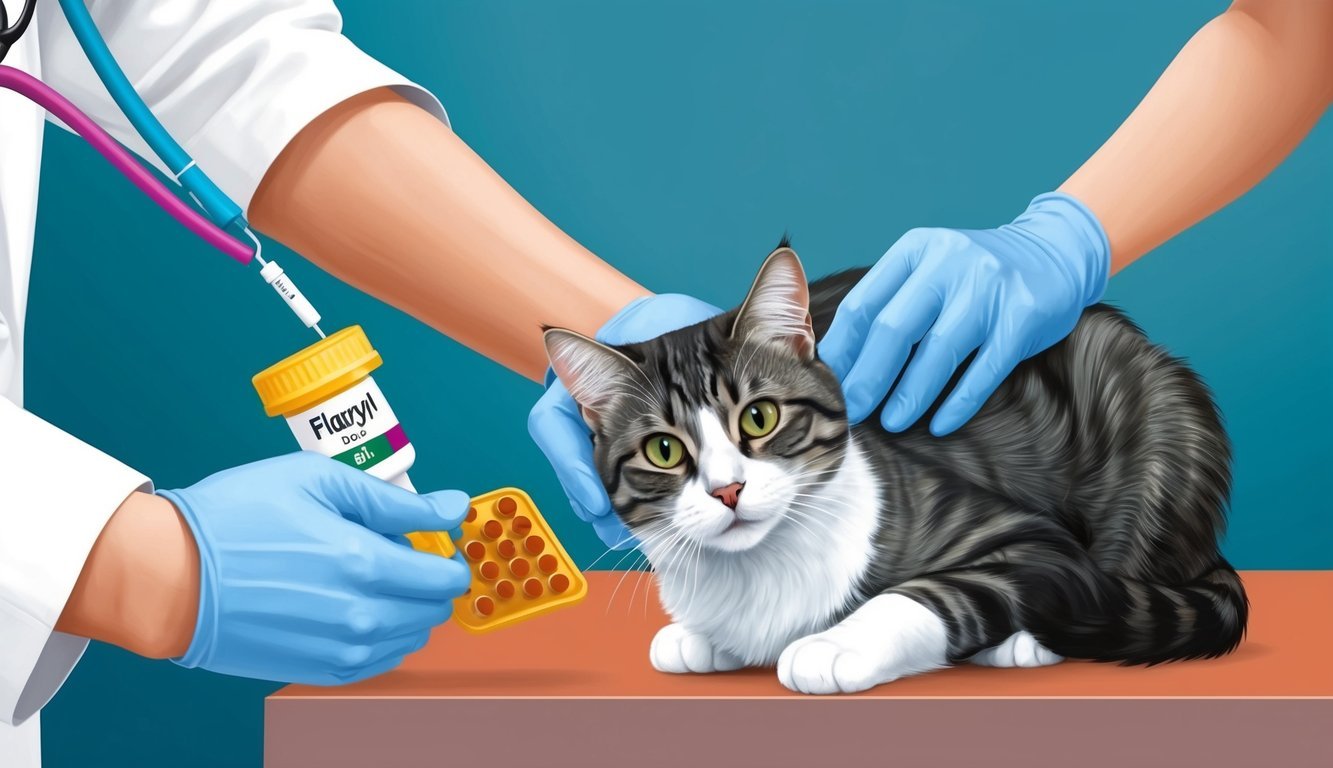
When using Flagyl (metronidazole) for your cat, there are several important factors to keep in mind.
Proper storage and handling, awareness of overdose scenarios, and regular monitoring can all help ensure your pet’s safety and the medication’s effectiveness.
Storage and Handling
Store Flagyl in a tightly sealed container, away from light and moisture.
The ideal temperature should be below 30°C (86°F).
If you have a special liquid formulation, follow any specific storage instructions your veterinarian provided, as some may require refrigeration.
Always keep the medication out of reach of pets and children to prevent accidental ingestion.
If you notice any signs of improper storage, such as changes in color or consistency, consult your veterinarian before use.
Overdose and Emergency
If you suspect your cat has received an overdose of Flagyl, seek immediate veterinary assistance.
Symptoms of overdose may include increased salivation, vomiting, or neurological signs such as seizures or disorientation.
Accurate dosing is crucial, typically around 7.5 to 10 mg/kg for diarrhea, but it can increase depending on the condition treated.
Keep a detailed record of administered doses to share with your veterinarian in case of an emergency.
Monitoring and Follow-Up
Regular monitoring is essential while your cat is on Flagyl.
Pay attention to how your pet responds to the medication, including any side effects like vomiting or changes in appetite.
Schedule follow-up appointments with your veterinarian to evaluate the treatment’s effectiveness and adjust dosages if necessary.
They may also recommend blood tests to monitor for potential side effects or toxic reactions, particularly if your cat is on long-term therapy.
FAQs and Common Concerns
You might have some questions about using Flagyl (metronidazole) for your cat.
Here are some common concerns you may encounter.
Can Flagyl cause appetite loss?
Yes, Flagyl can cause a decreased appetite.
Monitoring your cat’s eating habits during treatment is important.
What about neurologic signs?
In rare cases, metronidazole can lead to neurologic issues, especially at high doses.
Symptoms may include wobbly movements or seizures.
Is it effective against diarrhea?
Yes, Flagyl is used to treat certain types of diarrhea, including those caused by Clostridium.
Your vet can determine the best treatment for your cat’s specific condition.
What should I know about dosing?
The general dosage is 10-25 mg per kg every 12 hours.
Always follow your veterinarian’s instructions for dosing.
Can it affect the liver?
Monitor your cat for signs of liver toxicity, especially if they have underlying liver issues.
Are there any concerns during pregnancy?
Yes, using Flagyl during pregnancy is not recommended.
It can increase the risk of birth defects.
Does it interact with other medications?
Yes, Flagyl can interact with drugs like diazepam.
Discuss all medications your cat is taking with your vet.
Is there any anti-inflammatory benefit?
Metronidazole may have some anti-inflammatory properties, which can be helpful in certain conditions.
Frequently Asked Questions
When it comes to Flagyl for cats, you likely have several questions.
Below are common inquiries regarding its dosage, potential side effects, treatment duration, and more.
What’s the correct dosage of Flagyl for cats with diarrhea?
For treating diarrhea, the typical dosage of metronidazole (Flagyl) is between 7-10 mg/kg or 3-5 mg/lb.
It’s often given twice daily.
Always consult your veterinarian for precise dosing tailored to your cat’s specific needs.
Can side effects occur in cats taking Flagyl and what are they?
Yes, side effects can occur.
Possible reactions include nausea, vomiting, diarrhea, and changes in behavior.
If you notice any concerning symptoms, it’s essential to contact your vet for guidance.
How long is it safe for my cat to be treated with metronidazole?
Treatment duration usually ranges from 5 to 10 days, depending on the infection being treated.
Your veterinarian will determine the right length based on your cat’s condition.
What infections does Flagyl treat in felines?
Flagyl is commonly prescribed for bacterial infections, parasitic infections like Giardia, and inflammatory bowel disease.
Your vet will specify when it’s appropriate for your cat’s health.
Do I need to refrigerate Flagyl when prescribed for my cat?
No, Flagyl does not typically require refrigeration.
Store it in a cool, dry place, and keep it away from moisture and direct sunlight to ensure its effectiveness.
Why might a veterinarian recommend Flagyl for my cat?
A vet may recommend Flagyl to treat gastrointestinal infections.
This is particularly true when there’s evidence of bacteria or parasites.
It can also be helpful for cats with certain types of inflammatory bowel disease.
Always follow your vet’s recommendations for your cat’s health.


